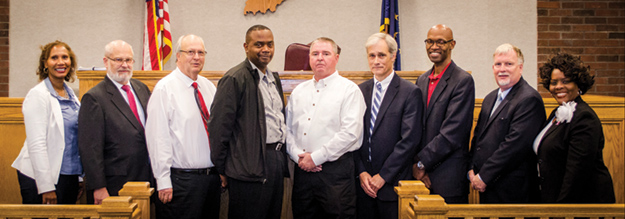
On July 18, 2011, an article appeared in the Wall Street Journal that criticized the operations of the nine township small claims courts in Marion County. The paper launched several additional stories covering litigant complaints of forum shopping, exorbitant attorney’s fees, and other unfair debt collection practices.
Under the leadership of Marion Circuit Court Judge Sheryl Lynch and former Circuit Court Judge Louis Rosenberg, the township courts have improved access to justice by standardizing court procedures and creating forms and instructional videos to better assist litigants. This process will culminate in the conversion of all Marion County small claims courts to full-time courts (and their judges to full-time judges) on January 1, 2017.
Small Claims Task Force and Report
The Indiana Supreme Court appointed current and former Court of Appeals judges John Baker and Betty Barteau to head the Marion County Small Claims Task Force. The Task Force held three public hearings in early 2012, soliciting comments from attorneys, litigants, and members of the public on procedures and policies in Marion County’s small claims courts that could benefit from reform.
In May 2012, the Task Force released its Report on the Marion County Small Claims Courts, detailing the issues raised and recommending changes to certain processes and procedures. The reforms recommended by the Task Force were designed to improve access to justice and eliminate the public perception of these courts as revenue-generators rather than impartial courts of law.
Court-led changes
Following the release of the Task Force’s Report, the Marion Circuit Court partnered with the Indiana Bar Foundation and the Indiana Supreme Court to produce a set of videos to inform small claims litigants of their rights and responsibilities. These are available on the Court’s Self-Service Legal Help Center website and distributed to each of the township small claims courts to be played outside the courtroom.
In 2012, the Marion Circuit Court convened an Advisory Committee, chaired by State Representative John Day, to review and comment upon proposed rules of procedure for the nine township small claims courts. With the Advisory Committee’s assistance, a total of 33 new Marion County Local Rules based on the Report’s recommendations were adopted, effective March 1, 2013.
These rules were enacted to combat specific concerns raised in the Report, including allegations that court staff were “rubber-stamping” final motions and orders that should have required judicial oversight; that attorney’s fees were often not reflective of the amount of time spent on a case; and, that defendants were being pressured into agreeing to turn over income or assets that should have been exempt from collection without being informed of their rights. In 2012, the Indiana Supreme Court also responded to complaints of forum shopping by amending Rule 12 of the Small Claims Rules to provide that proper venue for all landlord/tenant cases within Marion County is in the township where the real estate is located.

Legal changes
A 2014 decision interpreting the venue provisions of the Fair Debt Collection Practices Act (FDCPA) also impacted the litigation of Marion County Small Claims Court cases. The FDCPA requires a creditor to file suit in the “smallest judicial district” where venue is appropriate.
In Suesz v. Med-1 Solutions, LLC, 2014 U.S. App. LEXIS 12562 (7th Cir. 2014), the Seventh Circuit in a 3-2 decision reversed the District Court’s opinion that the nine Marion County townships were not separate judicial districts for FDCPA purposes. Prior to this decision, non-landlord debt collectors were free to file against Marion County defendants in any small claims court in the county. Today, creditors must file in the specific township in which the defendant resides or where the debt was incurred.
In July 2014, the National Center for State Courts (NCSC) followed up the Task Force’s Report with a study of its own and recommended that the small claims courts be incorporated into the Civil Division of the Marion Superior Court system, with judges elected by the township voters.
The Indiana General Assembly enacted measures to help the township small claims courts transition into full-time courts of record. In 2015, Senate Enrolled Act 523 made the following statutory changes to the Marion County small claims courts:
- Raising the jurisdictional limit to $8,000 (not including interest or attorney’s fees) effective July 1, 2015 (I.C. § 33-34-3-2);
- Making the small claims courts full-time courts (and their judges full-time judges) on January 1, 2017 (I.C. 33-34-1-6(c));
- Making them courts of record on July 1, 2018, and requiring appeals from a small claims judgment after this date to be taken to the Court of Appeals rather than tried de novo in the Marion Circuit or Superior courts (I.C. §§ 33-34-1-3(a), 33-34-3-15);
- Requiring the small claims courts to use the state’s centralized case management system
- (I.C. § 33-34-7-4); and
- Permitting judges of “low caseload courts” to be assigned to assist other Marion County small claims judges with their caseloads (I. C. § 33-34-5-7).
Four of the nine township courts (Center, Franklin, Lawrence, and Warren) became full-time courts in January 2016 – the remaining five (Decatur, Pike, Perry, Washington, and Wayne) will complete this shift in January 2017.
Judges of full-time courts may join the Indiana Judicial Conference, giving the township judges more opportunities for continuing judicial education and greater access to the Indiana Supreme Court’s Communications, Human Resources, and Judicial Ethics personnel. Judge Lynch recently spearheaded a small claims staff training using Judicial Conference materials and warmly recalls the trainees’ appreciation, declaring that the staff members were “so thrilled” with this guidance that she “probably got a million hugs.” Each of the nine township courts have designated a staff captain to put forth questions and provide ideas for future training sessions.
What’s next for the Marion County small claims courts?
Although reforms are ongoing, with the nine township judges meeting monthly to discuss proposed changes to rules and procedures, many substantive changes have already been made. As Judge Lynch stated: “We’re well on our way to making the small claims system better – but we’re not rushing through it. We’re taking the time to make sure if we make a decision not to change something, we’ve fully evaluated it.”
By the end of 2017, all nine township courts will be have adopted the Odyssey Case Management System. Along with county courts, the nine courts will participate in e-filing, giving litigants the option to file documents and track their case status online. This is a significant departure from the lengthy bus trips and expensive taxi rides many litigants without private transportation face when required to travel from one township to another.